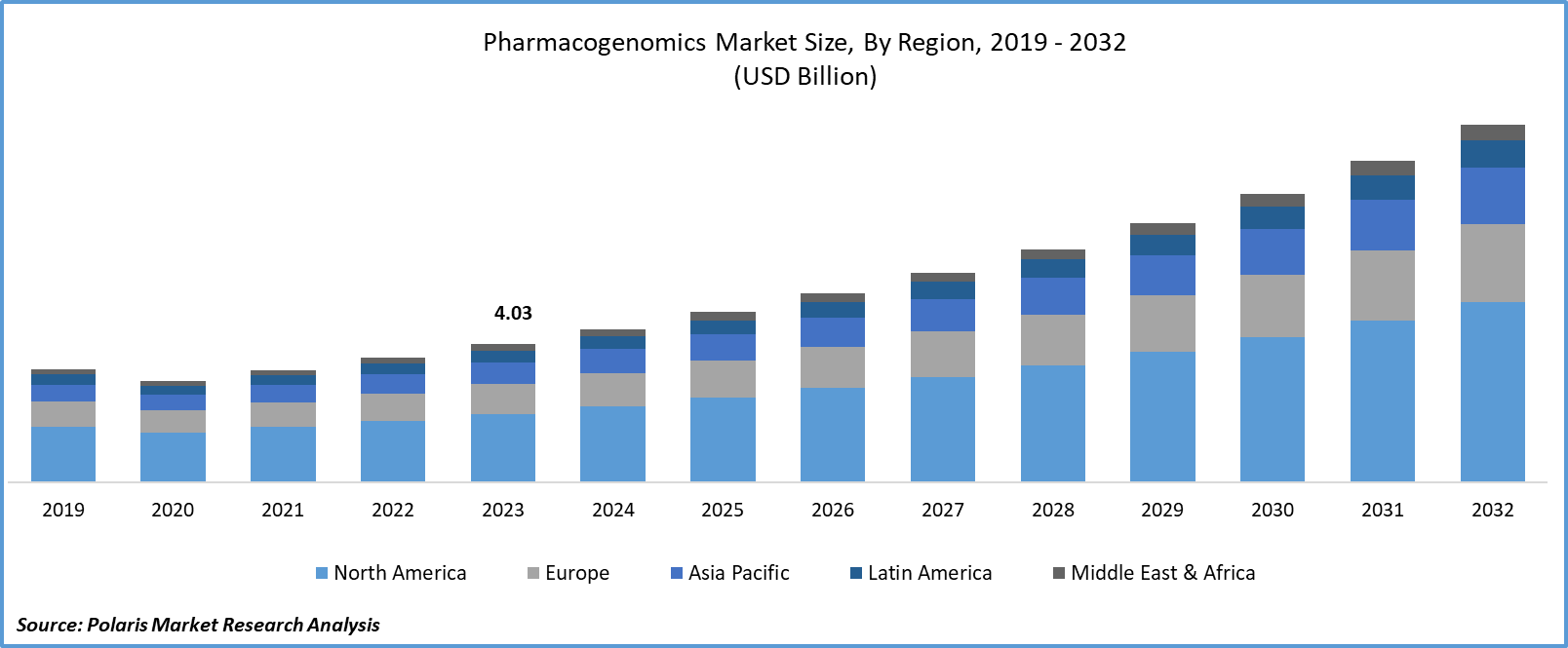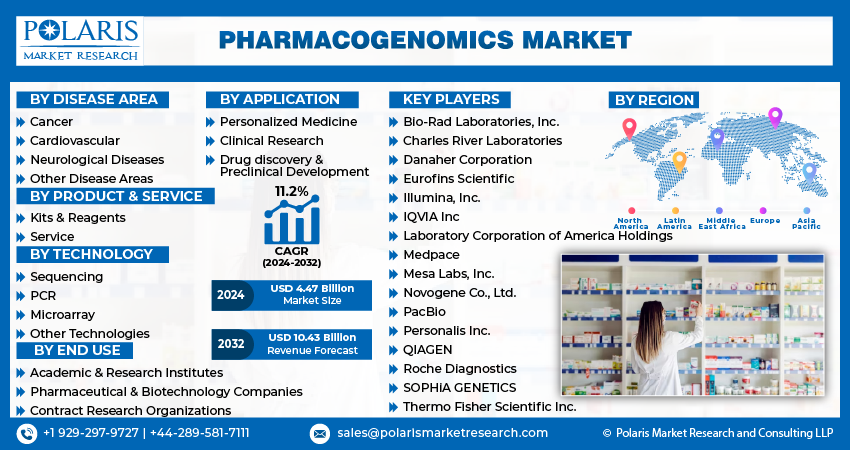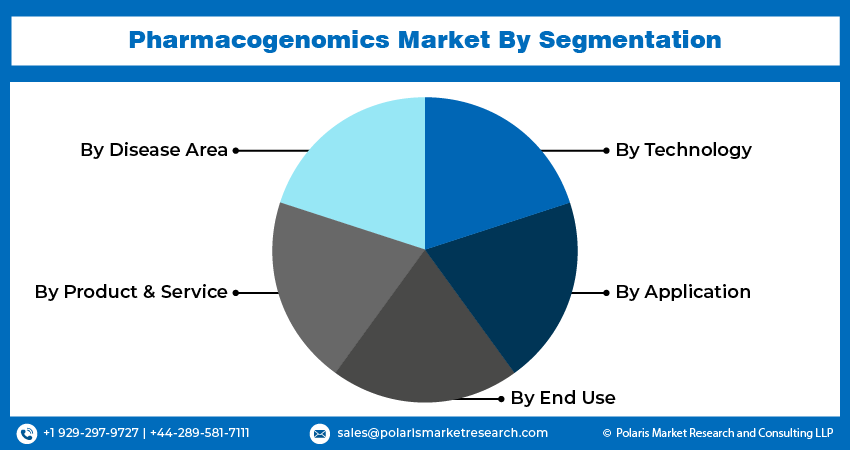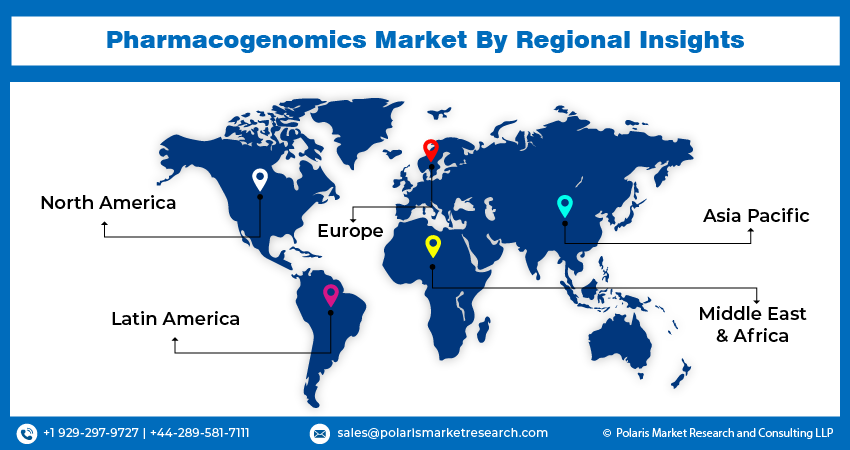
Pharmacogenomics Market Share, Size, Trends, Industry Analysis Report, By Disease Area (Cancer, Cardiovascular, Neurological Diseases, Other Disease Areas); By Product & Service; By Technology; By Application; By End-Use; By Region.; Segment Forecast, 2024- 2032
- Published Date:Mar-2024
- Pages: 118
- Format: PDF
- Report ID: PM4745
- Base Year: 2023
- Historical Data: 2019-2022
Report Outlook
Global pharmacogenomics market size was valued at USD 4.03 billion in 2023. The market is anticipated to grow from USD 4.47 billion in 2024 to USD 10.43 billion by 2032, exhibiting the CAGR of 11.2% during the forecast period.
Industry Trend
The pharmacogenomics market is experiencing a surge due to the growing adoption of precision medicine and heightened investment in the research and development of pharmacogenomics technologies, fostering the rapid advancement of novel products. Additionally, the market is being propelled by the increasing prevalence of adverse drug reactions worldwide. The emphasis on precision medicine is expected to bolster the pharmacogenomics market further, given its objective of integrating genetic and environmental data to customize treatments for various diseases.
However, with continuous advancements in digital technologies and biology, significant growth is forecasted for the pharmacogenomics market. Digital innovations can assist pharmaceutical companies in expediting their time-to-market and enhancing patient experiences, thus contributing to the market's lucrative expansion.

To Understand More About this Research: Request a Free Sample Report
Moreover, the uptick in research and development spending is driving the adoption of pharmacogenomics, with initiatives like the Israel Precision Medicine Partnership (IPMP) allocating substantial funds to research projects on personalized medicine across various diseases. This surge in R&D investment is anticipated to propel pharmacogenomics market growth in the coming years.
- For instance, In February 2024, according to the National Library of Medicine, Haplotype phasing of CYP2D6 involves determining the specific genetic variants present in an individual's CYP2D6 gene, which plays a crucial role in metabolizing a wide range of drugs. The allelic ratio method using Agena MassARRAY data is a technique used to analyze genetic data obtained from the Agena MassARRAY platform to identify and quantify different alleles present in the CYP2D6 gene.
Pharmacogenomics plays a crucial role in cancer treatment, improving patient survival rates and reducing unnecessary treatment costs for non-responsive patients. Despite these promising prospects, challenges related to reimbursement and issues associated with detecting gene variations affecting drug responses may pose obstacles to market growth during the forecast period.

Key Takeaway
- North America dominated the largest market and contributed to more than 37% of share in 2023.
- Asia Pacific region is expected to grow at the fastest CAGR during the forecast period.
- By technology category, sequencing segment accounted for the largest market share in 2023.
- By application category, the personalized medicine segment is projected to grow at a fastest CAGR during the projected period.
What are the market drivers driving the demand for the Pharmacogenomics Market?
The growing prevalence of disorders
The rising prevalence of various disorders, including cardiovascular diseases, cancer, neurological disorders, and psychiatric conditions, among others, is a major driver for the Pharmacogenomics Market. As these disorders become more prevalent globally, there is a growing need for more effective and personalized treatment approaches to address the diverse genetic factors influencing individual responses to medications.
Many disorders have a genetic component that influences disease susceptibility, progression, and response to treatment. Pharmacogenomics aims to understand how genetic variations impact drug metabolism, efficacy, and safety, thereby guiding personalized treatment decisions. As our understanding of the genetic basis of diseases expands, the importance of pharmacogenomics in tailoring treatments to individual patients becomes increasingly evident.
Pharmacogenomics enables healthcare providers to optimize drug therapy by identifying genetic factors that may influence drug response. This approach allows for the selection of medications and dosages that are most likely to be effective and safe for individual patients, due to improved treatment outcomes and reduced adverse drug reactions.
Which factor is restraining the demand for Pharmacogenomics?
High costs associated with research and development (R&D) are likely to impede market growth.
The high costs associated with research and development (R&D) efforts impact the pharmacogenomics market. These costs encompass the investment required for developing and refining pharmacogenomics technologies and solutions, which can be substantial and prohibitive for some market players. Additionally, a lack of awareness and inadequate infrastructural facilities in underdeveloped and backward economies present challenges for market penetration and adoption. Moreover, concerns regarding the side effects of drugs on health, coupled with the time involved in treatment and the adverse conditions arising from the COVID-19 outbreak, further impede market growth. The slow rate of approval for drugs and inhibitors, along with increasing cases of patent expiry, pose additional challenges to market expansion. These factors collectively contribute to restraining the growth rate of the Pharmacogenomics Market, highlighting the need for strategic interventions and solutions to mitigate these barriers and foster market advancement.
Report Segmentation
The market is primarily segmented based on disease area, product & service, technology, application, end use, and region.
|
By Disease Area |
By Product & Service |
By Technology |
By Application |
By End Use |
By Region |
|
|
|
|
|
|
To Understand the Scope of this Report: Speak to Analyst
Category Wise Insights
By Technology Insights
Based on technology analysis, the market is segmented on sequencing, PCR, microarray, and other technologies. Sequencing held the largest market share in 2023. Sequencing technologies, such as next-generation sequencing (NGS), play a crucial role in pharmacogenomics by enabling the comprehensive analysis of an individual's genetic makeup. This analysis helps identify genetic variations that influence drug responses, guiding personalized medication regimens.
Sequencing techniques offer high accuracy and precision in identifying genetic variations, including single nucleotide polymorphisms (SNPs), insertions, deletions, and structural variants. This level of detail is essential for understanding how genetic variations impact drug metabolism and response. Sequencing allows for the simultaneous analysis of multiple genes or genetic regions relevant to pharmacogenomics. This comprehensive approach provides a holistic view of an individual's pharmacogenetic profile, allowing healthcare providers to make informed decisions about drug selection, dosage, and treatment strategies.
By Application Insights
Based on application analysis, the market has been segmented on the basis of personalized medicine, clinical research, drug discovery & preclinical development. The personalized medicine segment is expected to be the fastest-growing CAGR during the forecast period. The personalized medicine segment is anticipated to exhibit the fastest Compound Annual Growth Rate (CAGR) during the forecast period within the Pharmacogenomics market for several compelling reasons. Personalized medicine, also known as precision medicine, represents a paradigm shift in healthcare, wherein treatments are tailored to the individual characteristics of each patient, including their genetic makeup, lifestyle, and environmental factors.
As healthcare systems worldwide increasingly prioritize personalized treatment strategies to improve patient outcomes and minimize adverse drug reactions, the demand for pharmacogenomics-based solutions is expected to surge. Moreover, advancements in sequencing technologies, bioinformatics, and data analytics have enhanced our understanding of the genetic basis of drug response variability, enabling more precise and targeted therapeutic interventions.

Regional Insights
North America
North America accounted for the largest market share in 2023. North America boasts advanced healthcare infrastructure, including well-established research institutions, pharmaceutical companies, and healthcare facilities, which have contributed to the early adoption and integration of pharmacogenomics technologies into clinical practice. Additionally, the region has a strong regulatory framework and favorable reimbursement policies that support the implementation of pharmacogenomics-based interventions.
North America has a robust ecosystem of genomic research and development, with significant investments in the biotechnology and pharmaceutical industries. These investments have propelled innovations in sequencing technologies, bioinformatics, and data analytics, enhancing the efficiency and accuracy of pharmacogenomics testing and analysis. Furthermore, the high prevalence of chronic diseases and genetic disorders in North America has increased the demand for personalized medicine approaches, including pharmacogenomics.
Asia Pacific
Asia Pacific region is expected to grow at the fastest CAGR during the forecast period. The Asia Pacific region is home to a significant portion of the global population, including diverse ethnicities and genetic backgrounds. This genetic diversity presents a unique opportunity for pharmacogenomics research, as variations in drug response genes may vary among different populations. Rapid economic development and urbanization in countries across the Asia Pacific region have led to increased healthcare expenditure and investment in advanced healthcare technologies, including pharmacogenomics. As healthcare systems in the region strive to enhance patient care and outcomes, there is growing interest in personalized medicine approaches, including pharmacogenomics, to tailor treatments to individual patients' genetic profiles.
Moreover, the Asia Pacific region is witnessing a rise in chronic diseases, such as cardiovascular diseases, cancer, and diabetes, which require long-term medication management. Pharmacogenomics holds promise in optimizing drug therapy, reducing adverse drug reactions, and improving treatment efficacy for these conditions, driving its adoption in clinical practice. Additionally, advancements in sequencing technologies, bioinformatics, and data analytics have made pharmacogenomics testing more accessible and cost-effective in the Asia Pacific region. This has facilitated the integration of pharmacogenomics into routine clinical care and has spurred the establishment of pharmacogenomics research initiatives and collaborations across the region.

Competitive Landscape
The Pharmacogenomics Market showcases fragmentation, characterized by a plethora of players competing within the sector. Key service providers in this field continually upgrade their technologies to sustain a competitive advantage, prioritizing reliability, efficiency, and safety. In their pursuit of a significant market share, these entities underscore the importance of strategic collaborations, continuous product improvements, and partnership initiatives to outperform their industry counterparts.
Some of the major players operating in the global market include:
- Bio-Rad Laboratories, Inc.
- Charles River Laboratories
- Danaher Corporation
- Eurofins Scientific
- Illumina, Inc.
- IQVIA Inc
- Laboratory Corporation of America Holdings
- Medpace
- Mesa Labs, Inc.
- Novogene Co., Ltd.
- PacBio
- Personalis Inc.
- QIAGEN
- Roche Diagnostics
- SOPHiA GENETICS
- Thermo Fisher Scientific Inc.
Recent Developments
- In July 2023, Illumina Inc. entered into a partnership with Pillar Biosciences Inc. to integrate Pillar’s oncology assays into Illumina’s global oncology product portfolio. This collaboration will merge a diverse array of next-generation sequencing solutions, establishing an exceptional suite of complementary tools.
- In April 2023, Archer NGS research assays from Invitae Corporation were acquired by Integrated DNA Technologies, Inc. This strategic move bolsters the xGen NGS lineup, expediting advancements in oncology research, with a particular focus on the discovery of novel cancer fusions.
Report Coverage
The Pharmacogenomics market report emphasizes on key regions across the globe to provide better understanding of the product to the uses. Also, the report provides market insights into recent developments, trends and analyzes the technologies that are gaining traction around the globe. Furthermore, the report covers in-depth qualitative analysis pertaining to various paradigm shifts associated with the transformation of these solutions.
The report provides detailed analysis of the market while focusing on various key aspects such as competitive analysis, disease area, product & service, technology, application, end use, and their futuristic growth opportunities.
Pharmacogenomics Market Report Scope
|
Report Attributes |
Details |
|
Market size value in 2024 |
USD 4.47 Billion |
|
Revenue forecast in 2032 |
USD 10.43 billion |
|
CAGR |
11.2% from 2024 – 2032 |
|
Base year |
2023 |
|
Historical data |
2019 – 2022 |
|
Forecast period |
2024 – 2032 |
|
Quantitative units |
Revenue in USD billion and CAGR from 2024 to 2032 |
|
Segments covered |
By Disease Area, By Product & Service, By Technology, By Application, By End Use And By Region |
|
Regional scope |
North America, Europe, Asia Pacific, Latin America; Middle East & Africa |
|
Customization |
Report customization as per your requirements with respect to countries, region and segmentation. |
FAQ's
Pharmacogenomics Market Size Worth $10.43 Billion By 2032
Key players in the market are Bio-Rad Laboratories, Inc., Charles River Laboratories, Danaher Corporation, Eurofins Scientific, Illumina, Inc
North America contribute notably towards the global Pharmacogenomics Market
Pharmacogenomics Market exhibiting the CAGR of 11.2% during the forecast period.
The Pharmacogenomics Market report covering key segments are disease area, product & service, technology, application, end use, and region.
